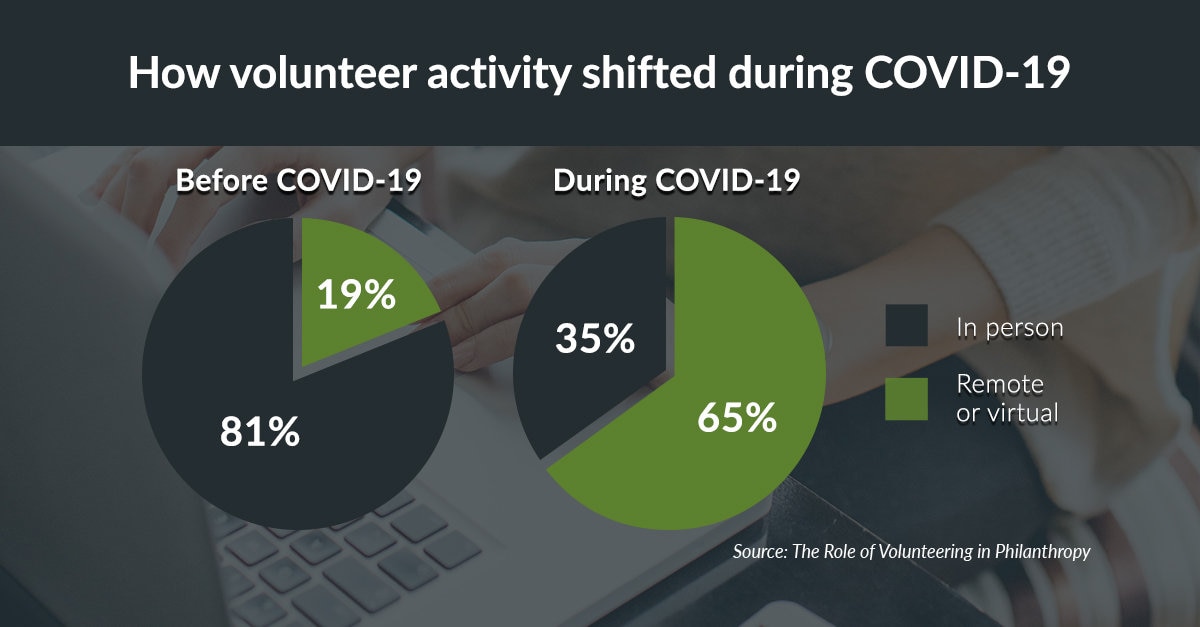Study: Two-in-three decreased or stopped volunteer activities due to COVID-19
BOSTON, November 11, 2020 – As the holidays approach—a time of year when nonprofits historically might have had to turn volunteers away—a new study by Fidelity Charitable, an independent public charity and the nation’s largest grantmaker, suggests that they may be facing shortages. Two-in-three volunteers decreased or stopped contributing time due to the pandemic. Of those who continued to volunteer, two-in-three turned to virtual or remote opportunities, compared to 81 percent of people who volunteered in-person before the pandemic. Sixty-four percent of those who hadn’t tried virtual or remote volunteer activities weren’t sure how to find them.

“This lack of awareness has hurt nonprofits at a time when they are already suffering more than ever before. Charities essentially lost access to millions of dollars1 in volunteers’ time,” said Amy Pirozzolo, Head of Donor Engagement for Fidelity Charitable. “But nonprofits have found creative new ways that people can safely engage, and we strongly encourage donors to explore how they can continue giving both their time and much-needed financial support. This can be as simple as reaching out to a nonprofit you care about and asking how you can assist, even if that looks different than it has previously.”
Many nonprofits include information about current volunteer needs on their websites, and organizations such as VolunteerMatch, local United Way chapters and Points of Light offer listings of volunteer opportunities at multiple charities. The report findings also suggest nonprofits should be proactive about informing their supporters of ways they can continue to safely offer help, as they adapt their volunteer programs.
Meals on Wheels historically leaned heavily on volunteers, but has had to shift its model as a result of the pandemic. Ellie Hollander, president and CEO of Meals on Wheels America, said many volunteers previously delivered meals in-person, but now make calls or write letters to seniors to safely provide valuable social interaction.
“They’re like pen pals, they’re checking in on them,” she said. However, Hollander noted that growth in demand has forced Meals on Wheels to hire paid drivers—which is a shift from their traditional reliance on volunteer support. “Whatever you’re doing, don’t stop now,” Hollander said, noting that needs are rising. “Don’t stop caring, don’t stop volunteering, don’t stop checking in on people.”
The report findings signal the decrease in volunteerism may be temporary, with nearly three-quarters of donors saying they plan to return to pre-pandemic volunteerism levels when it is safe to do so. But as social distancing continues, nonprofits may need to look to new models for the long term.

Volunteerism has always been a valuable way to cultivate donor engagement. Before the pandemic forced many to curtail their volunteer activities, nearly two-thirds of financial donors recently volunteered their time to a charitable cause. Most donors offer financial support first, but four-in-ten are more likely to donate their time before committing their charitable dollars.
Generational shift to shape the future
As nonprofits consider how short-term and long-term trends shape their approach to engaging volunteers, the study can help them better understand key differences between Millennial volunteers and prior generations. Significantly, the study found:
- Millennials have a stronger preference for skills-based volunteer opportunities—while other generations prefer to serve in less skilled roles by lending a hand, such as serving in a food kitchen.
- One-in-three Millennials said they give more to the nonprofit they volunteer with than they would if they didn’t volunteer—compared to less than a quarter of Gen X and only 12 percent of Baby Boomers.
- Thirty-five percent of Millennials recently volunteered for three or more organizations, compared to less than a quarter of Gen X and Boomers.
- Pre-pandemic, nearly half of younger donors said the amount of time they volunteered increased in the last two years—compared to a quarter of Boomers and 29 percent of Gen X.

To read the full report, visit: https://www.fidelitycharitable.org/insights/the-role-of-volunteering-in-philanthropy.html
Methodology: Artemis Strategy Group, an independent research firm, conducted a research study on behalf of Fidelity Charitable about how donors engage in volunteerism. 1,842 adults in the U.S. who donated at least $1,000 to charity in 2019 were surveyed in March 2020. Later, in August 2020, a survey was conducted among 491 Fidelity Charitable donors about how volunteerism was impacted by COVID-19.
1Based on Independent Sector’s estimate of $27.20 as the average value of a volunteer’s hour
About Fidelity Charitable
Fidelity Charitable is an independent public charity that has helped donors support more than 300,000 nonprofit organizations with more than $42 billion in grants. Established in 1991, Fidelity Charitable launched the first national donor-advised fund program. The mission of the organization is to grow the American tradition of philanthropy by providing programs that make charitable giving accessible, simple and effective. Visit www.fidelitycharitable.org.
Want to learn more?
Explore other news and resources, or reach out to us for a media inquiry.
